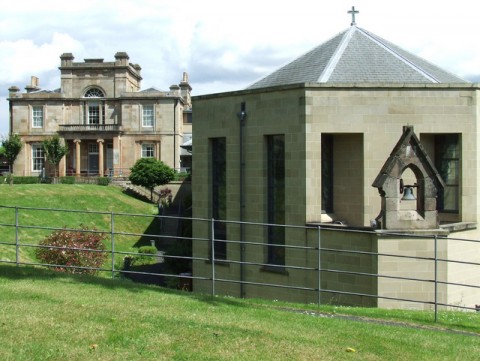December 1 | ![]() 0 COMMENTS
0 COMMENTS ![]() print
print

Sanctuary: chapel is a haven of peace
ROSS AHLFELD on the delight of experiencing Mass at the Holy Rosary Residence in Greenock -By ROSS AHLFELD
Like me, you might have been following the debates around Pope Francis’s latest document Magnum Principium, which moves, from the
Vatican to our national conferences of bishops, the responsibility and authority for translations of the texts used for Mass into modern languages.
This move has left me with more questions than answers and I’m not entirely sure how I feel about yet another potential change to the words used during Mass.
For example, a few years back I seem to recall some of our more traditionally minded Scottish Catholics expressing a little criticism of Pope Emeritus Benedict XVI’s changes to the text.
This was because it resulted in the removal of the pious Scottish custom of kneeling for most of the Eucharistic prayers and consecration, despite the fact Pope Emeritus Benedict’s ‘reform’ restored the vernacular Mass to a more faithful wording of the traditional Latin Mass.
I wonder then, do those same folks with a special devotion to traditional liturgy now criticise Pope Francis for returning that authority back to the bishops, a move which could – in theory – eventually free up the bishops to then restore the aforementioned venerable Scottish practice of kneeling?
Are they now grateful to the Pope for allowing the freedom for us to celebrate Mass in a more reverential manner as per the customs of our country? I suspect that they will be mostly critical of the Holy Father for allegedly fermenting the prospect of diversity, thus risking a split in our deeply cherished Catholic unity.
Equally, I’ve listened to some among the faithful – who often wax lyrical on the glories of the Ambrosian, Mozarabic and Sarum rites – now up in arms about the Pope returning some liturgical freedom to the bishops. As others have observed, the rule seems to be: if it happened before 1570, it’s ‘organic development,’ if after, it’s ‘liturgical abuse.’
Personally, I too share some reservations about Pope Francis rolling back Pope Emeritus Benedict’s efforts to make sure all local translations adhered to the correct Latin translation. To be honest, I don’t really fancy going back to, ‘Peace be with you, and also with you.’ Similarly, I’ve come to love ‘consubstantial’ and ‘like the dewfall.’
Does all this make your head hurt? It certainly hurts mine! As always, I look to my own tradition for answers since Catholic Worker co-foundress Dorothy Day was regarded as something of a liturgical traditionalist. Yet even Dorothy Day admits to being deeply moved by what she describes as the ‘Mass on Junk Hill,’ where a group of destitute Mexicans ‘gave the best they could.’
Equally, she described how she eventually came to be reconciled with the popular folk Masses of the 1960s but did not want them every day, anymore than she ever wanted solemn Gregorian Requiem Masses every day.
To be honest, this explanation did not satisfy me. I still felt as if I was missing some kind of insight on this issue, but I really didn’t know what it was?
How many times have we all searched far and wide for that which was under our noses the whole time? Similarly, how often do we feel a deep sense of longing and yearning for something which we know not what? Germans have a word for this: ‘Sehnsucht.’
This is exactly how I felt before experiencing Mass at the nearby Little Sisters of the Poor’s Holy Rosary Residence care home in Greenock, the destination of my most recent monthly pilgrimage.
The beautiful little Holy Rosary chapel lies at the heart of the care home and I found it to be a place of real sanctuary and tranquillity.
The Little Sisters of the Poor were established back in 1839 by St Jeanne Jugan to care for the elderly. These days, the Sisters have now established various care homes such as The Holy Rosary Residence. For me, this is a noble charism since our elderly brothers and sisters are often described as ‘thestewards of a sacred memory,’ while Pope Francis has said grandparents are ‘the living memory of the family.’
Jean Vanier expands on this idea: “Older people have a freedom of heart and their acceptance of their limitations and weakness makes them people whose radiance illuminates the whole community.
“They are gentle and merciful symbols of compassion and forgiveness. They become a community’s hidden treasures, sources of unity and life. They are true contemplatives at the heart of community.”
For older people, daily Mass at the Holy Rosary Residence isn’t only the fundamental act of worship. Mass can also serve different social and psychological functions.
In addition to worship, the opportunity to go to Mass can provide social and emotional interaction with staff and others. Even those residents with dementia often participate in prayers, singing and the Eucharist. Most of all, I love the fact that a Mass at the care home can be slightly slower than a mainstream parish Mass.
I believe that there is a unique spirituality to be found in a Mass which requires time and patience. In my opinion, it makes it special and holy. More so, everyone helps – the Sisters are there to assist the priests, the carers are there to assist the residents and together they do liturgy.
Liturgy is, after all, a doing thing: it is the work of the people – the sisters, care workers, residents, retired priests, friends and families and neighbours all working together to offer a sacred, reverential celebration of Mass.
For example, while maintaining the structure and chief elements of the rite, sometimes the priests will perhaps sit down to offer Mass.
Such very ‘minor adjustments’ will be familiar to anyone fortunate enough to share a workplace with individuals with additional support needs, learning difficulties or some kind of disability. Minor adjustments are really all that is required and in my opinion, they are always worth making as to create a diverse and exciting workplace, just as minor adjustments allow us to open up our workplaces to the gifts and joy which comes from maintaining a diverse workforce.
Similarly, a slight change to the form of Mass also brings a humble and sanctifying element to our celebration of the Eucharist.
Herein lies the great paradox – a truly holy and deeply devout celebration of Mass being offered where minor adjustments to the rubrics have been made; minor adjustments which might upset the hardliners within the ranks of the self-appointed ‘liturgical police’ but which nonetheless render liturgy debates meaningless.
For me, the true efficacy and sincerity of a Mass such as this provides me with a profound precedent for reflection whenever I consider the pros and cons around something like Magnum Principium.
Even so, it is somewhat ironic to think of all the diverse and far flung pilgrimages I’ve made in search of something which was right here on my doorstep. I was seeking manifestations of the French Catholic Revival which I admire so much, a combination of Catholic personalism with social action.
For instance, the co-founder of Catholic Worker, Peter Maurin, was himself a product of the French Catholic Revival, associated with Charles Péguy, Jacques Maritain, Marc Sangnier and others. Peter Maurin was even known to say: “There is a man in France called Emmanuel Mounier. He wrote a book called The Personalist Manifesto. You should read that book.”
Yet, here was that same personalism which I had sought, perfectly expressed in the Little Sisters respect for life and for the dignity and uniqueness of every person.
Here was that ‘French Catholic Revival’ inheritance of rich spirituality given to us (in a simpler form without the intellectualism) by St Jeanne Jugan; an imitation of Christ in his poverty, gentleness and humility; devotion to the Eucharist, the Word of God and the Sacred Heart.
In truth, I was seeking a holy place where I might encounter a real community – the body of Christ – forged by our shared vulnerability. A place where the liturgy is alive.
That place is the Holy Rosary Residence: a community where our dear elders become their true selves – children of God – and together with the carers, staff, Sisters, family and friends, they form a communion of saints.
God bless the Little Sisters and everyone at the Holy Rosary Residence and may St Joseph, patron and protector of the Little Sisters and St Jeanne Jugan, pray for us all.











